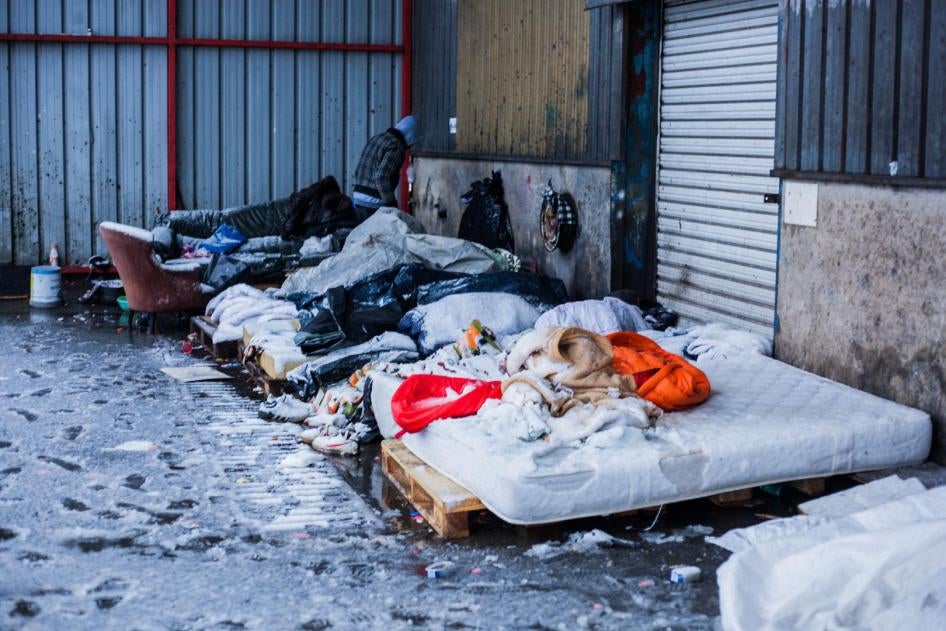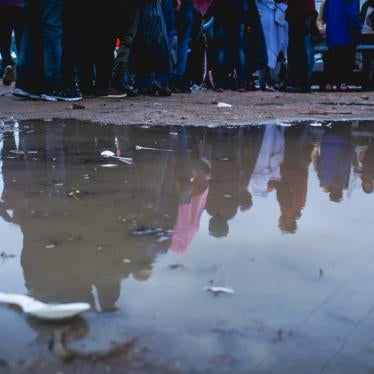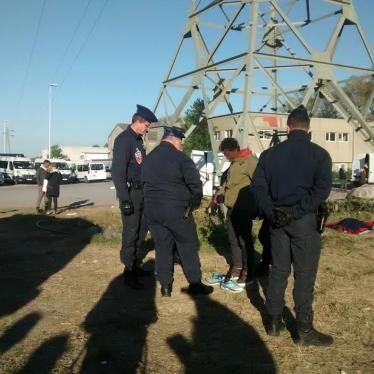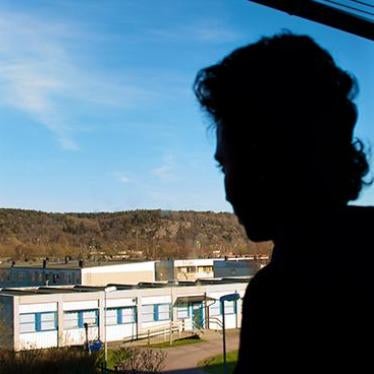(Paris) – Migrants and asylum seekers in Calais are facing desperate living conditions, especially as temperatures drop, Human Rights Watch said today. Many child and adult migrants described an increase in the police destruction and confiscation of their belongings since the beginning of November 2017, making it harder for the migrants to live outdoors.
Police in the northern French city employ excessive force against asylum seekers and other migrants. The police frequently confiscate or destroy asylum seekers’ and other migrants’ sleeping bags, clothing, and other possessions, apparently to deter migrants from staying in Calais.
“The ongoing police violence and destruction and confiscation of people’s belongings is inhumane and unconscionable,” said Bénédicte Jeannerod, France director at Human Rights Watch. “The French authorities should immediately put an end to these abuses and ensure that migrants are treated with the dignity to which every human being is entitled.”
Human Rights Watch found that as recently as the first week of December, police, particularly the riot police (Compagnies républicaines de sécurité, CRS), have confiscated or destroyed asylum seekers’ and other migrants’ personal belongings, such as sleeping bags, blankets, clothing, and sometimes phones, medication, and documents.
At least 500 migrants and asylum seekers, of whom an estimated 100 are unaccompanied children, are living on the streets and in wooded areas in and around Calais. Most are from Eritrea, Ethiopia, and Afghanistan.
Since the closure of the “Jungle” camp in Calais by the French authorities in October 2016, municipal and national authorities have repeatedly spoken of the desire to avoid the re-establishment of another permanent settlement in or near the city, where migrants had gathered in the hope of reaching the United Kingdom. For a time, the French authorities defied a court order to provide clean drinking water and other limited humanitarian services to asylum seekers and other migrants, though this has now been partially remedied.
Human Rights Watch interviewed 36 migrants including asylum seekers, of whom 20 were unaccompanied children, in Calais in early December. Human Rights Watch also spoke with 23 staff and volunteers with nongovernmental organizations providing humanitarian, legal, and medical support. In addition to confiscation of personal items, Human Rights Watch documented physical abuse of migrants by police and harassment of aid workers.
This follows Human Rights Watch research in June and July, which documented excessive use of force toward migrants by police in Calais including the routine use of irritant gas, as well as the regular confiscation of their possessions, disruption of aid delivery, and harassment of aid workers. The French ombudsman’s office (Defenseur des Droits), the National Consultative Commission for Human Rights (Commission Nationale Consultative des Droits de l’Homme, CNCDH), and many of the aid groups operating in and around Calais, including L’Auberge des Migrants and Help Refugees, have published similar reports of police abuse in the months since the closure of the large migrant camp.
In response to Human Rights Watch’s findings and the reports of the French ombudsman, Interior Minister Gérard Collomb announced that the French administration and security forces’ internal investigations departments would investigate policing practices in Calais. The official investigators’ report, completed in October, found convincing evidence that police used excessive force and committed other abuses, and called for improvements in the practices employed by police operating in Calais when confronting asylum seekers and other migrants.
“These acts represent a strategy of harassment and exhaustion on the part of the authorities, aimed at deterring the presence of migrants in Calais,” said Loan Torondel, coordinator at the Auberge des Migrants, a French humanitarian organization. “Leaving vulnerable people with no shelter in this weather is causing them to become increasingly desperate.” The group has also documented police confiscation and destruction of migrants and asylum seekers’ tents, tarpaulins, sleeping bags, and other belongings, most recently in a report published earlier in December.
On December 11, after several weeks of increasingly cold weather, but before they were required by law to do so, Calais city officials opened emergency accommodation for two days, later extended through the morning of December 18. According to information provided by local authorities to aid organizations, this accommodation consists of containers with 70 places for women, children, and vulnerable people such as the elderly and the ill, and a warehouse with 200 places for men. They are open only at night.
Accounts from aid agencies on the ground varied, but some said that migrants were required to take specific buses, for which they had to assemble at specified departure points before 7 p.m. each day, or be transported by emergency services. They said that people who reached the emergency shelter by other means, such as on foot, were turned away and that a lack of information about the opening of the shelters and the procedures for entry meant that others were unable to access the accommodations.
The decision by local authorities to open emergency shelters before they were strictly required to do so was consistent with President Emmanuel Macron’s commitments. He said in July: “By the end of the year, I do not want to have men and women on the streets, in the woods. I want emergency accommodations everywhere.”
The authorities should keep emergency accommodation open for the duration of the winter and throughout the day as well as at night to ensure adequate protection for those who would otherwise be homeless, including asylum seekers and other migrants, Human Rights Watch said. Authorities should also end abusive policing practices, discipline officers who abuse their power, and carry out the recommendations made by the French administration and security forces’ internal investigations departments in October.
“Police abuse and harassment shouldn’t constitute a building block of France’s policy toward migrants and asylum seekers,” Jeannerod said.
Living Conditions
The precarious living conditions are taking their toll on the mental well-being of asylum seekers and other migrants, medical workers told Human Rights Watch. As temperatures have grown colder, aid workers have noted that migrants face higher risk of frostbite and hypothermia. The aid groups are carrying supplies of gloves, hand warmers, and similar emergency supplies.
Other common health conditions include scabies; trench foot, a painful condition from having wet feet for prolonged periods; ear, nose, and throat conditions; and muscular and back pains linked to living outside. Regular laundering of clothes and bedding is necessary to prevent scabies.
Following a ruling in late July by France’s highest administrative court, the Conseil d’Etat, the local government installed some water sources, toilets, and showers. However, migrants and asylum seekers cannot wash and dry their clothing and bedding.
French law requires opening emergency accommodation for all homeless people, including undocumented migrants, when the weather meets certain conditions, for instance when the temperature falls to -5º Celsius (23º Fahrenheit) on two consecutive nights and also remains at or below freezing during the daytime. Local officials can, at their discretion, open emergency shelters in less severe conditions.
Other Abuse
Human Rights Watch also documented recent cases of physical violence against asylum seekers and other migrants by police, including being hit in the hands, legs, and ankles, sometimes when they were sitting peacefully at distribution sites, sleeping, or had just been awakened. Some migrants and asylum seekers, both children and adults, said they had been sprayed with irritant gas when they were sleeping. Medical workers reported treating migrants and asylum seekers for eye irritation and other symptoms consistent with these accounts.
Human Rights Watch found that the police harassed aid workers with repeated identity checks and citations for minor infractions, such as insufficient windscreen wiper liquid, parking fines, and low tire pressure. One aid worker said that police have checked some staff and volunteers’ identity documents numerous times in a single day.
Accounts from Unaccompanied Children, Adult Migrants
Most names used have been changed and some other identifying information has been withheld to protect the privacy of the people interviewed. If an age is given, it is the age the person reported to Human Rights Watch.
“They scare me, I don’t like the police of Calais. I like the police of France, but not Calais. They sprayed me in the face three days ago, and all over my body. They took all my things.”
- Young boy [age and nationality withheld], December 6, 2017
“They took all our sleeping bags today [December 5], after midday. Animals get more respect than we people do here.”
- Adult man from Ethiopia, December 5, 2017
“I sleep in the forest. Police [come] daily. They gas. They hit.… Two weeks ago, they sprayed me in the eyes and I had to spend one day in hospital.”
- 15-year-old boy from Eritrea, December 5, 2017
I’ve been sprayed two times. It hurts bad. It’s burning too. It takes two, three days to not hurt. It’s really burning. The skin, too. [..] The second time [I was sprayed], I was sleeping. They wake me up and sprayed. They did this to all of us.”
- Adult man from Ethiopia, December 5, 2017
“This morning the police came, more than 25. They took all our sleeping bags, took my phone…. When they come, they beat us. They take our sleeping bags, our jackets, every time. They hit me sometimes. They use gas, all over my face. They say, ‘Don’t sleep. Go!’ …. Now life is not good. Now it starts to rain, ice. The night is very, very cold. We sleep outside at night but don’t have anything.”
- 17-year-old boy, “Kuma,” from Oromia, December 5, 2017
“I sleep under the bridge…. Yesterday, police came with spray. They sprayed my face, sprayed everywhere. I don’t have a sleeping bag – police took it.”
- 15-year-old boy from Oromia, “Neissa,” December 5, 2017
“Police take sleeping bags, blankets… this is normal. Police spray me in the eyes, nose, mouth. I cough for 20, 30 minutes after.”
- Young boy [age and nationality withheld], December 6, 2017
“It’s very bad. The police come in the morning. They take your sleeping bag and spray in the face, in the eyes. This is the CRS [the French riot police].”
- 18-year-old man from Eritrea, December 6, 2017
“Calais is not good. Police come every time. They collect clothes, spray, hit. It is very bad. The CRS every time, night and day. They take blankets, sleeping bag, even clothes. Today, [they took] my sleeping bag…. [I was] hit on the leg. This morning, they sprayed my eyes and clothes. Yesterday it was my clothes.”
- 16-year-old Ethiopian boy, December 6, 2017










